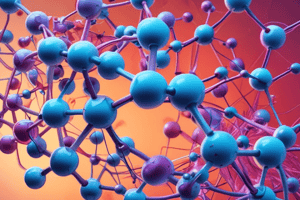Podcast
Questions and Answers
What is the main purpose of understanding reactions and mechanisms in organic chemistry?
What is the main purpose of understanding reactions and mechanisms in organic chemistry?
- To predict outcomes based on reactants, conditions, and mechanism (correct)
- To memorize different types of chemical transformations
- To focus solely on stereochemistry
- To avoid studying functional groups
What is a functional group in organic chemistry responsible for?
What is a functional group in organic chemistry responsible for?
- Predicting optical rotation signs
- Affecting proton distributions
- Exhibiting characteristic chemical behavior (correct)
- Determining molecular weight
What property characterizes molecules that have mirror images that cannot superimpose onto each other?
What property characterizes molecules that have mirror images that cannot superimpose onto each other?
- Optical rotation
- Isomerism
- Stereochemistry
- Chirality (correct)
Which spectroscopic technique is used to reveal electronic transitions in molecules?
Which spectroscopic technique is used to reveal electronic transitions in molecules?
What kind of reactions involve the spatial arrangement of atoms and molecular geometry?
What kind of reactions involve the spatial arrangement of atoms and molecular geometry?
How do functional groups affect the properties of substrate molecules?
How do functional groups affect the properties of substrate molecules?
Which element plays a central role in organic chemistry due to its ability to form diverse molecular structures?
Which element plays a central role in organic chemistry due to its ability to form diverse molecular structures?
What does the systematic nomenclature in organic chemistry help chemists with?
What does the systematic nomenclature in organic chemistry help chemists with?
In the name 'ethanol', what does the 'eth' part refer to?
In the name 'ethanol', what does the 'eth' part refer to?
What does the '-anol' suffix indicate in the name 'ethanol'?
What does the '-anol' suffix indicate in the name 'ethanol'?
Why is carbon considered fascinating in organic chemistry?
Why is carbon considered fascinating in organic chemistry?
What role does IUPAC play in organic chemistry?
What role does IUPAC play in organic chemistry?
Study Notes
Organic Chemistry: Unraveling Carbon's Enchantment
Organic chemistry is more than just another branch of science; it's a captivating exploration into carbon's vast array of possibilities. It deals with the study of organic compounds — molecules containing primarily carbon atoms connected via covalent bonds, often bound to hydrogen, oxygen, nitrogen, sulfur, phosphorus, chlorine, bromine, iodine, and silicon. This discipline has profound impacts across various fields like agriculture, pharmaceuticals, materials science, environmental protection, food technology, and energy production.
Carbon, element number six on the periodic table, boasts unique properties that make organic chemistry fascinating. These qualities enable it to form diverse molecular structures, many of which have essential biological roles. As we delve deeper into these aspects, let's dissect the intriguing world of organic chemistry.
Molecular Structures and Nomenclature
In organic chemistry, chemists describe compound structures using systematic nomenclature rules developed by IUPAC (International Union of Pure and Applied Chemistry). For instance, consider ethanol: its name derives from 'eth', denoting one methyl group (-CH₃), and '-anol', signifying its alcohol functionality (ie., -OH attached to the parent chain). In contrast, toluene is named after toluidine dye (which contains a phenyl ring—C₆H₄) plus suffix '-ene' indicating aliphatic unsaturation and '-e' specifier for aromaticity.
Reactions and Mechanisms
Understanding the reactions and mechanisms behind bond breakage and formation is crucial in learning organic chemistry. Common types of chemical transformations include nucleophilic substitution (S₂N and E2 processes), electrophilic addition, elimination, free radical reactions, and acid–base interactions. Each reaction type follows specific patterns and requirements, allowing us to predict outcomes based upon reactants, conditions, and mechanism.
Functional Groups
One of the central concepts in organic chemistry revolves around functional groups. A functional group is a distinct portion within a molecule responsible for exhibiting characteristic chemical behavior. Some common examples encompass carbonyls (like ketones and aldehydes), alcohols, carboxylic acids, amines, halogens, and epoxides. Undergoing various chemical modifications, these functional groups can alter the properties and applications of substrate molecules.
Stereochemistry
A vital aspect of organic chemistry is stereochemistry, dealing with molecular geometry and spatial arrangement of atoms. Chirality is a key concept herein, characterizing molecules whose mirror images cannot superimpose onto each other. Examples abound, such as L-amino acids and D-glucose. Stereoisomers result when chiral centers reside within a molecule, giving rise to optically active species (with different optical rotation signs under polarized light) possessing unique physical properties and biologic activities.
Spectroscopy and Physical Techniques
Various analytical techniques are applied in organic chemistry to probe structural information about molecules. UV-Vis spectroscopy reveals electronic transitions; IR spectroscopy detects vibrational modes involving bonds and functional groups; NMR spectroscopy elucidates proton distributions, carbon environments, and atom connectivity. Additionally, mass spectrometry and chromatography methods help purify samples and deduce molecular weight data, respectively.
As you navigate the delicate yet lively landscape of organic chemistry, remember that patience, perseverance, and attention to detail will undoubtedly reward your efforts with remarkable discoveries and insights about life itself!
Studying That Suits You
Use AI to generate personalized quizzes and flashcards to suit your learning preferences.
Description
Delve into the captivating world of organic chemistry, unraveling the secrets behind carbon's enchanting properties and its impact on various fields like pharmaceuticals and materials science. Explore topics such as compound nomenclature, reaction mechanisms, functional groups, stereochemistry, and analytical techniques like spectroscopy. Patiently navigate the intricate landscape of organic chemistry for remarkable discoveries about life itself.



